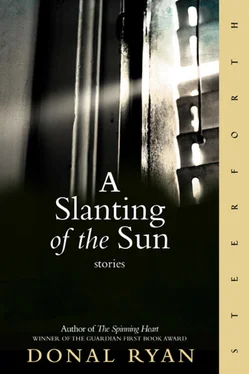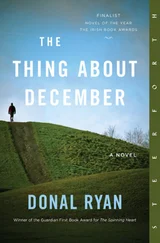There are days when it seems as though they are the only three things to ever have happened. I got married, I had a love affair, my son was killed. Someone now, some expert in the ways of human minds, looking from a cold distance at me and at the way I carried on, would say I was suffering then from some kind of depression or disorder or some such nonsense. But James stole into my life smiling, and the sight of him, his presence in a room, caused the air to thicken, my mind to slow, my heart to quicken. I don’t understand fully still to this day what came over me, or out of me, or what kind of a spell he cast on me, but I nearly drowned myself in foolishness and heat. The noise of those days, the burning joy, the wildness. He was a young widower; his wife had haemorrhaged in childbirth, his daughter was born to sadness and he told me these things in a soft voice, and he told me how he loved to talk to me, how he loved to look at my eyes, how he loved me. He kissed me and I lost my reason. When the church roof was mended and the fundraising committee we co-chaired was disbanded he came to our house and sat in the dining room and gripped this hand so hard it pained me and he asked me to come away with him and his teenaged daughter to England, and to bring little Stephen with me, and I nearly said yes until some gentle draught Pierse created in his effort to surprise me caused me to turn my head and see him there, at that doorway, with his gift for me on the palm of his trembling hand.
We’re going well now, with our ball. The squeezing and passing from left hand to right hand to partner, and the wait to take it back, have fallen to an easy rhythm. Our knees are almost touching, I can feel the warmth of him. A strange, fortunate symmetry, that his left side was struck and my right, his within six months of mine. Mini-strokes, the doctors said. There’ll be more, as likely as not. Tremors before the earthquakes. The ball falls from his hand; he sucks his teeth in crossness at himself. He looks at me, he stretches out his arm. He grips my hand and pulls lightly and I use the last of my fleeing strength to cross the space between us and turn myself so that I’m sitting on his lap. My necklace swings outwards, the little heart describes an arc and settles again on my chest. I’m seventy-seven and I’m twenty, my child is dead and he hasn’t yet been born, there’s a thickening of the air about me again in this day room, in this honeymoon suite, and my heart is slowing and my mind is quickening and the arms are tight around me and the breath and tears are on my face of the man I pledged to God to love and honour all my days.
MY FIRST WEDNESDAY here the Orthodox Christian priest strode in long-bearded and black-eyed. He embraced me and kissed me on my cheeks, he in a frock and me in a smock, and he called me Brother. Being green and unsure of the prevailing custom I only stood and smiled at him and he smiled back at me with his hands on my shoulders and said, We will be friends. And he strode back out and across and up the wide and dusty street to his own tiny stone church. It’s peaceful here, my oldest parishioner told me. There was a thing once, a terrible thing that happened, but it was a hotness of the blood, a sudden, silly thing, young men … And he trailed off and said no more about it and I thought no further about his intimations and worked each day in the cool inside of my church and welcomed all who entered here.
A local boy in his late teens or early twenties came here one day and said his name was Halim and asked did I know a place called Tipperary. It’s where I’m from, I told him. He laughed and a light in his eyes danced. His cousin lived there. What is this place like? he asked. I told him about the green fields and low hills and forests and valleys and the villages and towns and the speedy drawly talk of the people. They must like chips, he said. My cousin is a rich man. He drives a Mercedes. He sells chips at curling matches in the summer. Hurling, I corrected him. I showed my new friend my hurley and sliotar, and pucked it against the transept wall. His eyes widened. I rang home for another hurley. It came with a shipment of vestments and wine. He’d come to the church in the cooling evening and say, Few pucks, Father? And every time I heard these words I laughed and he laughed with me and we pucked our sliotar up and down the street.
It became a thing in the town, a break in the sunwashed greyness. The hurleys and the sliotar and the priest. Slitter, shlitter, pucks, hoorleys, hurlings, roars of laughter. An imam strolled slowly down to our quarter one still day and watched silently, then smiled at me and asked could he try. He threw the sliotar and swung wildly and missed and my young friend Halim laughed and quickly caught himself. He spoke gently with careful deference to the old man and I saw by his gestures he was telling him to throw the ball slightly higher and farther outwards from his body, to keep his eye on it all the time, to grip with his left hand lower. The imam connected cleanly on his third try and smiled in satisfaction. He raised his hand and bowed slightly and walked back towards his mosque.
A band of hooting watchers formed. We took to having our few pucks at the same time each evening, after their prayers and our devotions. The hurleys were passed from hand to hand; some quickly caught the hang of it, more swung wild and awkward and rarely connected. When leather fell square and clean on ash and my sliotar soared skyward a roar went up and rose with the swirling dust raised by the minor stampede of men and boys trying to catch the falling ball. A man brought a baseball catcher’s mitt one day and the others booed. He handed it shamefaced to me and pretended he had brought it as a gift.
I rang home for as many hurleys as could be sent. A note came one day from the station that there was a delivery waiting there for me. My curate, a small and quiet man from Clare, handed it to me with a ghost of a smile; we walked through the market and past the commercial quarter and the old traders’ mansions and along the open railway that flanked the olive plantation to the paved widening in the street of dust and stones that served as the train station. We hefted a dozen hurleys home. My quiet curate sweated under his burden of ash. He tutted and huffed and muttered under his breath about me and my blasted hurleys. But when we grounded our load in the sacristy he exhaled loudly and I saw on his face a smile of tired satisfaction, and I heard him later as I stood unseen by him at the altar door, blessing the heap of hurleys and all who would play with them.
The first long puck competition was held the same day the idea of it was conceived. Landed balls were marked in dust and each man stood by his line. Arguments over whose was which threatened to end badly, until the Orthodox lad offered to officiate. A hundred yards was measured with a hand-rolled odometer borrowed from the municipal authority by the cousin of a friend of a hurler called Ahmed. Pucks were measured back from or up from the hundred-yard line. Ah lads, call a howlt, I’d shout in an exaggerated Irish accent if a row broke out, and they’d echo me, laughing. Ah lads, call a howlt! would ring along the sun-baked street as far as the marketplace. I got off a good one, clean and high. At least fifteen yards out from the previous leader. Applause rippled upwards from the marketplace like a handful of pebbles landing in water. Halim stepped up next and smiled at me before launching a sliotar skyward. It will come down with snow on it, eh, Father? And we laughed as the Orthodox priest shouted, Tie! It is a dead tie!, and supporters of my friend Halim protested and measured with fingers and feet and squinted eyes and declared Halim the champion and the competition to be a fix. The decision that one last puck each would decide the day was greeted with silence, then Ha- lim , Ha- lim , chanted rhythmically, rising in speed and volume as my friend toed the line we had drawn in the dust and swung in a tidy and powerful arc and sent the ball buzzing low and fast through the still and heavy air. I shook Halim’s hand before taking my shot and he smiled at me nodding and my curate suddenly broke free of his quietness and roared Go on, Father Anthony, give it holly, lash into it! But my ball fell short of the mark that was scraped in the dust of the street moments earlier and Halim was hoisted shoulder-high and carried off a hero.
Читать дальше












